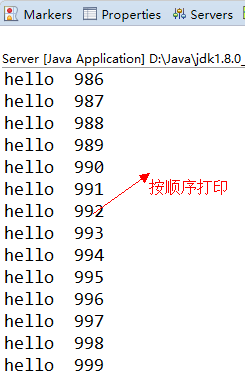粘包与分包问题的出现及解决
目录
一、粘包出现的原因
二、案例展示
三、分包
四、解决办法
一、粘包出现的原因
服务端与客户端没有约定好要使用的数据结构。Socket Client实际是将数据包发送到一个缓存buffer中,通过buffer刷到数据链路层。因服务端接收数据包时,不能断定数据包1何时结束,就有可能出现数据包2的部分数据结合数据包1发送出去,导致服务器读取数据包1时包含了数据包2的数据。这种现象称为粘包。
二、案例展示
【1】服务端代码如下,具体注释说明
package com.server;
import io.netty.bootstrap.ServerBootstrap;
import io.netty.channel.Channel;
import io.netty.channel.ChannelFuture;
import io.netty.channel.ChannelInitializer;
import io.netty.channel.ChannelOption;
import io.netty.channel.nio.NioEventLoopGroup;
import io.netty.channel.socket.nio.NioServerSocketChannel;
import io.netty.handler.codec.string.StringDecoder;
import io.netty.handler.codec.string.StringEncoder;
/**
* Netty5服务端
* @author zhengzx
*
*/
public class ServerSocket {
public static void main(String[] args) {
//创建服务类
ServerBootstrap serverBootstrap = new ServerBootstrap();
//boss和worker
NioEventLoopGroup boss = new NioEventLoopGroup();
NioEventLoopGroup worker = new NioEventLoopGroup();
try {
//设置线程池
serverBootstrap.group(boss,worker);
//设置socket工厂,Channel 是对 Java 底层 Socket 连接的抽象
serverBootstrap.channel(NioServerSocketChannel.class);
//设置管道工厂
serverBootstrap.childHandler(new ChannelInitializer() {
@Override
protected void initChannel(Channel ch) throws Exception {
//设置后台转换器(二进制转换字符串)
ch.pipeline().addLast(new StringDecoder());
ch.pipeline().addLast(new StringEncoder());
ch.pipeline().addLast(new ServerSocketHandler());
}
});
//设置TCP参数
serverBootstrap.option(ChannelOption.SO_BACKLOG, 2048);//连接缓冲池大小
serverBootstrap.childOption(ChannelOption.SO_KEEPALIVE, true);//维持连接的活跃,清除死连接
serverBootstrap.childOption(ChannelOption.TCP_NODELAY, true);//关闭超时连接
ChannelFuture future = serverBootstrap.bind(10010);//绑定端口
System.out.println("服务端启动");
//等待服务端关闭
future.channel().closeFuture().sync();
} catch (Exception e) {
e.printStackTrace();
} finally {
//释放资源
boss.shutdownGracefully();
worker.shutdownGracefully();
}
}
} 【2】ServerSocketHandler处理类展示:
package com.server;
import io.netty.channel.ChannelHandlerContext;
import io.netty.channel.SimpleChannelInboundHandler;
public class ServerSocketHandler extends SimpleChannelInboundHandler{
@Override
protected void messageReceived(ChannelHandlerContext ctx, String msg) throws Exception {
System.out.println(msg);
}
}
【3】客户端发送请求代码展示:
package com.client;
import java.io.IOException;
import java.net.Socket;
import java.net.UnknownHostException;
public class Client {
public static void main(String[] args) throws UnknownHostException, IOException {
//创建连接
Socket socket = new Socket("127.0.0.1", 10010);
//循环发送请求
for(int i=0;i<1000;i++){
socket.getOutputStream().write("hello".getBytes());
}
//关闭连接
socket.close();
}
}
三、分包
数据包数据被分开一部分发送出去,服务端一次读取数据时可能读取到完整数据包的一部分,剩余部分被第二次读取。具体情况如下图展示:

四、解决办法
【方案一】:定义一个稳定的结构。
【1】包头+length+数据包:客户端代码展示:包头用来防止 socket攻击,length用来获取数据包的长度。
package com.server;
import java.io.IOException;
import java.net.Socket;
import java.net.UnknownHostException;
import java.nio.ByteBuffer;
import org.omg.CORBA.PRIVATE_MEMBER;
import org.omg.CORBA.PUBLIC_MEMBER;
/**
* @category 通过长度+数据包的方式解决粘包分包问题
* @author zhengzx
*
*/
public class Client {
//定义包头
public static int BAO = 24323455;
public static void main(String[] args) throws UnknownHostException, IOException {
//创建连接
Socket socket = new Socket("127.0.0.1", 10010);
//客户端发送的消息
String msg = "hello";
//获取消息的字节码
byte[] bytes = msg.getBytes();
//初始化buffer的长度:4+4表示包头长度+存放数据长度的整数的长度
ByteBuffer buffer = ByteBuffer.allocate(8+bytes.length);
//将长度和数据存入buffer中
buffer.putInt(BAO);
buffer.putInt(bytes.length);
buffer.put(bytes);
//获取缓冲区中的数据
byte[] array = buffer.array();
//循环发送请求
for(int i=0;i<1000;i++){
socket.getOutputStream().write(array);
}
//关闭连接
socket.close();
}
}
【2】服务端:需要注意的是,添加了MyDecoder类,此类具体下面介绍
package com.server;
import java.net.InetSocketAddress;
import java.util.concurrent.ExecutorService;
import java.util.concurrent.Executors;
import org.jboss.netty.bootstrap.ServerBootstrap;
import org.jboss.netty.channel.ChannelPipeline;
import org.jboss.netty.channel.ChannelPipelineFactory;
import org.jboss.netty.channel.Channels;
import org.jboss.netty.channel.socket.nio.NioServerSocketChannelFactory;
import org.jboss.netty.handler.codec.string.StringDecoder;
import org.jboss.netty.handler.codec.string.StringEncoder;
public class Server {
public static void main(String[] args) {
//服务类
ServerBootstrap bootstrap = new ServerBootstrap();
//boss线程监听端口,worker线程负责数据读写
ExecutorService boss = Executors.newCachedThreadPool();
ExecutorService worker = Executors.newCachedThreadPool();
//设置niosocket工厂
bootstrap.setFactory(new NioServerSocketChannelFactory(boss, worker));
//设置管道的工厂
bootstrap.setPipelineFactory(new ChannelPipelineFactory() {
@Override
public ChannelPipeline getPipeline() throws Exception {
ChannelPipeline pipeline = Channels.pipeline();
pipeline.addLast("decoder", new MyDecoder());
pipeline.addLast("handler1", new HelloHandler());
return pipeline;
}
});
bootstrap.bind(new InetSocketAddress(10101));
System.out.println("start!!!");
}
}
【3】MyDecode类:需要继承FrameDecoder类。此类中用ChannelBuffer缓存没有读取的数据包,等接收到第二次发送的数据包时,会将此数据包与缓存的数据包进行拼接处理。当return一个String时,FarmedDecoder通过判断返回类型,调用相应的sendUpStream(event)向下传递数据。源码展示:
public static void fireMessageReceived(
ChannelHandlerContext ctx, Object message, SocketAddress remoteAddress) {
ctx.sendUpstream(new UpstreamMessageEvent(
ctx.getChannel(), message, remoteAddress));
}当返回null时,会进行break,不处理数据包中的数据,源码展示:
while (cumulation.readable()) {
int oldReaderIndex = cumulation.readerIndex();
Object frame = decode(context, channel, cumulation);
if (frame == null) {
if (oldReaderIndex == cumulation.readerIndex()) {
// Seems like more data is required.
// Let us wait for the next notification.
break;
} else {
// Previous data has been discarded.
// Probably it is reading on.
continue;
}
}我们自己写的MyDecoder类,代码展示:(包含socket攻击的校验)
package com.server;
import org.jboss.netty.buffer.ChannelBuffer;
import org.jboss.netty.channel.Channel;
import org.jboss.netty.channel.ChannelHandlerContext;
import org.jboss.netty.handler.codec.frame.FrameDecoder;
public class MyDecoder extends FrameDecoder{
@Override
protected Object decode(ChannelHandlerContext arg0, Channel arg1, ChannelBuffer buffer) throws Exception {
//buffer.readableBytes获取缓冲区中的数据 需要 大于基本长度
if(buffer.readableBytes() > 4) {
//防止socket攻击,当缓冲区数据大于2048时,清除数据。
if(buffer.readableBytes() > 2048) {
buffer.skipBytes(buffer.readableBytes());
}
//循环获取包头,确定数据包的开始位置
while(true) {
buffer.markReaderIndex();
if(buffer.readInt() == Client.BAO) {
break;
}
//只读取一个字节
buffer.resetReaderIndex();
buffer.readByte();
if(buffer.readableBytes() < 4) {
return null;
}
}
//做标记
buffer.markReaderIndex();
//获取数据包的发送过来时的长度
int readInt = buffer.readInt();
//判断buffer中剩余的数据包长度是否大于单个数据包的长度(readInt)
if(buffer.readableBytes() < readInt) {
//返回到上次做标记的地方,因为此次数据读取的不是一个完整的数据包。
buffer.resetReaderIndex();
//缓存当前数据,等待剩下数据包到来
return null;
}
//定义一个数据包的长度
byte[] bt = new byte[readInt];
//读取数据
buffer.readBytes(bt);
//往下传递对象
return new String(bt);
}
//缓存当前数据包,等待第二次数据的到来
return null;
}
}
【4】服务端,处理请求的handler。
package com.server;
import org.jboss.netty.channel.ChannelHandlerContext;
import org.jboss.netty.channel.MessageEvent;
import org.jboss.netty.channel.SimpleChannelHandler;
public class HelloHandler extends SimpleChannelHandler {
private int count = 1;
@Override
public void messageReceived(ChannelHandlerContext ctx, MessageEvent e) throws Exception {
System.out.println(e.getMessage() + " " +count);
count++;
}
}
【方案二】:在消息的尾部加一些特殊字符,那么在读取数据的时候,只要读到这个特殊字符,就认为已经可以截取一个完整的数据包了,这种情况在一定的业务情况下实用。
![]()
----架构师资料,关注公众号获取----

